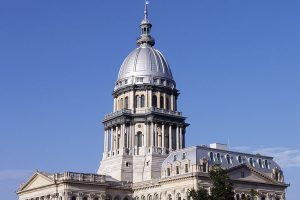Understanding intergenerational poverty: Q&A with Illinois State Rep. Lamont Robinson
Publisher: Alex Hylka

Recently, Chicago and other areas around Illinois have experienced a spike in violence, which has many people asking why and what can be done to address it. We at ICOY believe that there is a link between violence and poverty, with violence primarily being a symptom of poverty.
To shed light on this topic and talk about initiatives underway at the state level to better understand and address poverty’s far-reaching grasp on families and communities, ICOY invited State Representative Lamont J. Robinson, Jr. (5th District) to speak to our members about the Intergenerational Poverty Act. This Act, which seeks to understand and address the root causes of poverty and economic insecurity, including contributing social, economic, and cultural factors, establishes a Commission on Poverty Elimination and Economic Security.
This Commission is tasked with educating policymakers on the impact poverty has on other measures of economic stability and outcomes, including educational attainment, rates of incarceration, lifetime earnings, access to health care, healthcare outcomes, and access to housing. The intention is that the Illinois Department of Human Services will support the Commission to complete its work to produce a strategic plan that addresses poverty and economic insecurity by November 30, 2021.
Below is a transcript of our conversation with State Representative Robinson, who has been instrumental in the development of the Intergenerational Poverty Act and its Commission:
ICOY CEO Andrea Durbin:
First off, we want to welcome Representative Robinson! He’s currently the lead House sponsor for ICOY’s Medicaid Technical Assistance Center (MTAC) bill and legislation, and he’s already been a voice for youth in care, particularly on issues surrounding young people who are LGBTQ.
To start the conversation, Representative Robinson, can you tell us a little bit about the impetus for the creation of the Intergenerational Poverty Act and the Commission that you’ve assembled? Because I know you were really instrumental in that.
State Representative Lamont J. Robinson, Jr.:
So even prior to COVID-19, I realized that one of the reasons we’re seeing high violence numbers in the city of Chicago is because violence is attached to poverty – and poverty is intergenerational. Because of this, I wanted to find a way for us to study poverty and figure out how to eradicate it in Illinois.
We can put more police on the street, but that’s not getting to the root cause of what we’re seeing. Instead, the root of the violence is poverty, which impacts access to quality healthcare, education, childcare, housing, food, jobs, etc. For example, the recent closures of hospitals in neighborhoods on Chicago’s South and West sides are perpetuating poverty by creating healthcare deserts – especially during a time when communities of color are being hit hardest by COVID-19. So the lack of access to all of these stabilizing factors cannot be ignored when we look at the high rates of violence and shootings in Chicago. This is why I support the MTAC bill and why it’s so important to fund it. It’s important to pull together experts and try to get to the bottom of poverty – not only in Chicago, but across the state because there are pockets everywhere struggling with poverty and violence.
Durbin:
Thank you for that background. This is not the first time that Illinois has tried to evaluate the root causes of poverty and develop solutions. At one point, the state had a goal of reducing poverty by 50% by 2015. Considering this, where do you think we’ve failed in the past on this issue? And how do you think this Commission will be able to take a different approach?
Robinson:
That’s a good question. In the past, we’ve had studies, but there hasn’t been funding to enforce and support the findings. But I think now is the time given all of the challenges that we’re seeing (such as COVID-19, looting, and shootings) and the fact that we have a Governor that gets it. I think the difference from what I’ve seen in previous years from just doing a study that ends up sitting on a shelf is that we have the people in place who are looking to enforce it and also put the funding there to support the programs and non-profits doing the work.
Durbin:
You’re right – resources make a huge difference. While poverty affects people and communities across the state, Black and Brown people are disproportionately experiencing poverty and especially intergenerational poverty. Do you think that the Commission can address some of the legacies of historical racism and help remove some of the barriers that have prevented people from being able to reach their potential and thrive?
Robinson:
That is certainly the plan and part of what we want to study and address. Because I believe what we’re seeing right now cannot be separated from this legacy, we cannot continue business as usual.
Durbin:
Great. And do you see a role for community-based organizations, such as our members, to help conceptually approach these issues as we advocate for policy change? Are there opportunities for organizations like us to help advance those goals?
Robinson:
When I met you, I mentioned that as a legislator we are pulled in a lot of different directions. It’s important that I build relationships with groups like ICOY and its members to direct and guide my focus – I don’t have eyes in all places and there are going to be things that I miss. With the Commission’s study, I’m hoping to both include representatives from organizations, as well as identify organizations to fund that are doing great work.
Durbin:
Thank you for your consideration and leadership on this. When we think about the factors – like homelessness or trauma – that place children and youth at risk of involvement in the juvenile justice or child welfare system, poverty really is at the root. For us and our members, addressing these factors of poverty is at the core of the work that we are doing in the community.
Are any other specific ways that we can be of assistance or partner with you on these issues?
Robinson:
As I mentioned early, I believe the MTAC bill is extremely important because it addresses one of the key factors of poverty. However, it’s going to be a heavy lift. Advocacy and education from you and your members to obtain support on the bill are critical to its passage. It’s important that we start working on that advocacy now to gain support for the bill on both sides of the aisle for when the veto session starts in November.
Durbin:
Yes, absolutely. It’s now more important than ever because as you mentioned, the coronavirus has exposed disparities across the board. Plus, it’s increased the number of people who rely on Medicaid for their physical/behavioral healthcare and exacerbated the acuity of need that people have as they’re struggling with the effects of the pandemic (e.g. increased risk of suicide and addiction, as well as trauma and isolation). All of this has increased peoples’ need for physical and behavioral healthcare in their communities from providers they trust. So, the passage of the MTAC bill is really important.
Robinson:
Exactly. I know I’m going to need help in having conversations with legislators across the state to convey this message and get the bill passed.
Durbin:
Representative Robinson, I’m really grateful that you made the time to speak with our members today about this important work. Thank you!
Uncategorized






